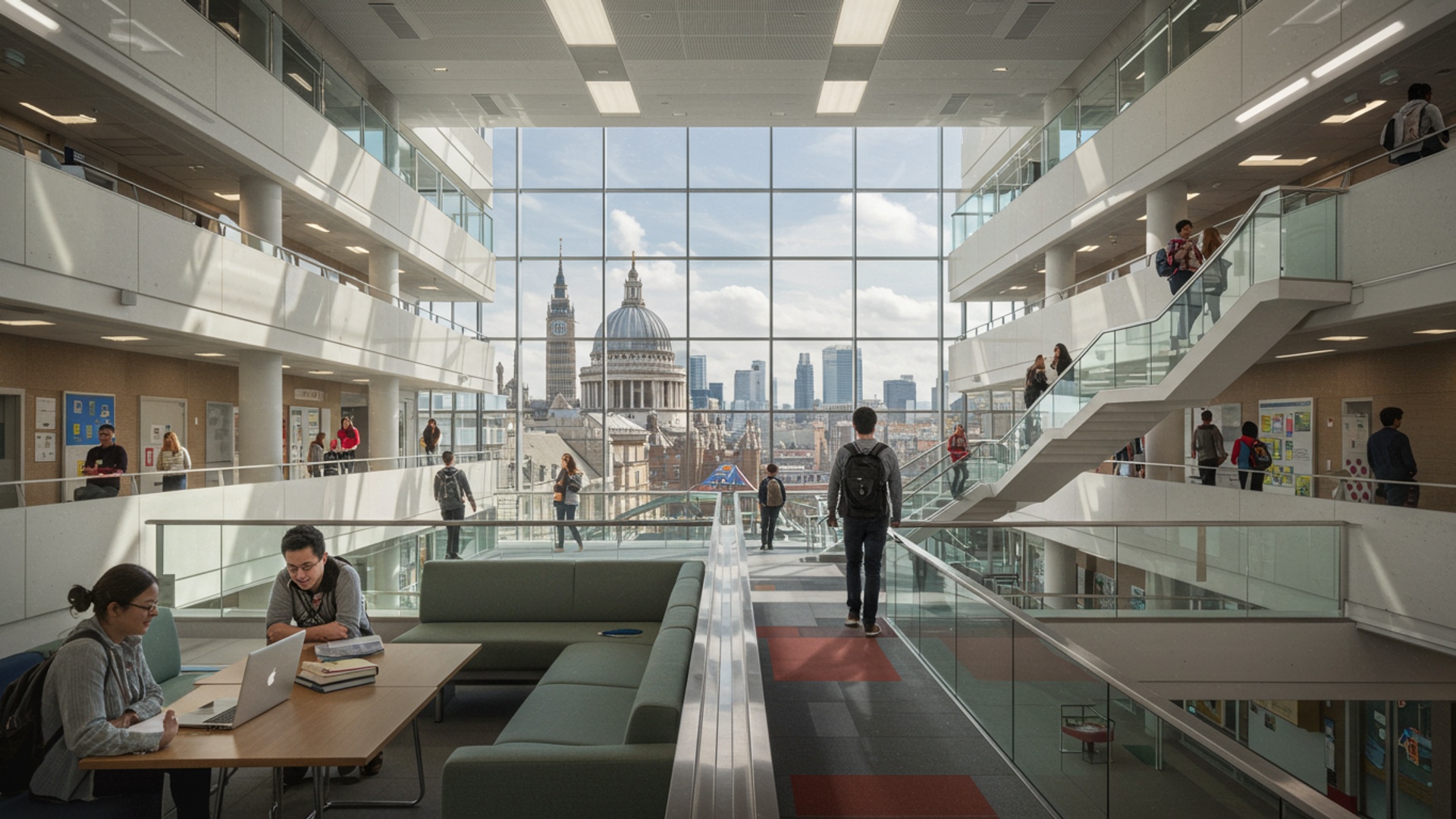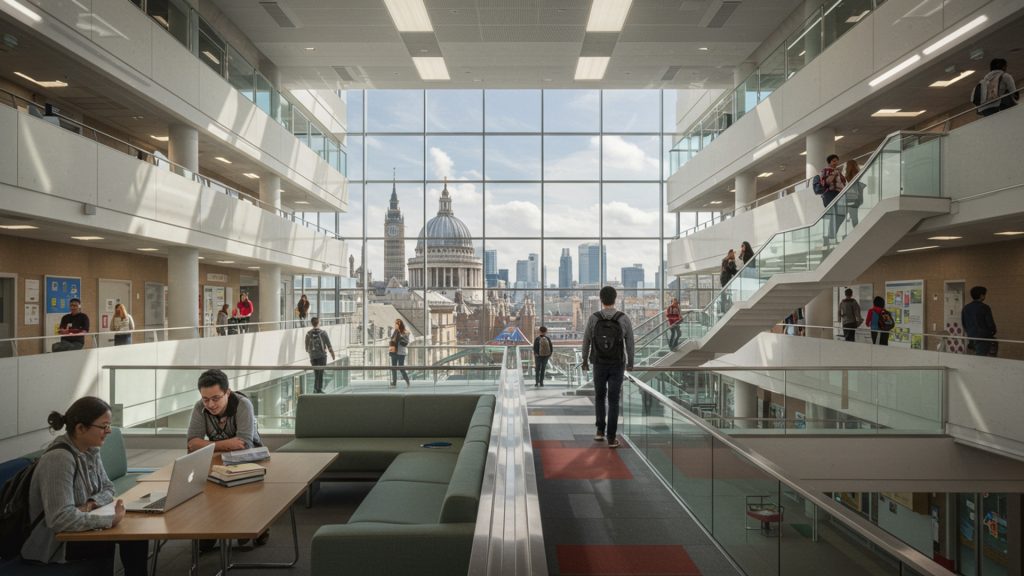Navigating the complexities of a rapidly evolving global landscape necessitates an education rooted in pioneering innovation, a principle central to University College London. UCL consistently pushes academic frontiers, exemplified by its cutting-edge research in fields like synthetic biology at the UCL Institute of Health Informatics and the transformative urban planning models developed within the Bartlett. Beyond academic rigor, UCL cultivates an exceptionally dynamic student experience, where a global community converges amidst London’s vibrant cultural ecosystem. Here, students not only access interdisciplinary programs but also forge invaluable connections and participate in initiatives like the Grand Challenges, preparing them to lead and innovate in their chosen fields.

The Legacy of Innovation at University College London
Stepping onto the historic grounds of University College London, one immediately senses a profound connection to a legacy of pioneering spirit. Established in 1826, University College London was founded on radical principles, being the first university in England to admit students regardless of their religion and the first to welcome women on equal terms with men. This commitment to inclusivity and intellectual freedom continues to define its approach to education and research today. The term ‘innovation’ at University College London isn’t just a buzzword; it’s embedded in its DNA, referring to a constant pursuit of new knowledge, interdisciplinary collaboration. the application of research to solve real-world problems. This ethos ensures that students are not merely recipients of knowledge but active participants in its creation, preparing them for a future that demands adaptability and forward-thinking.
A Glimpse into Groundbreaking Academic Programs
University College London is renowned for its diverse and often unconventional academic offerings that actively break down traditional disciplinary silos. These innovative programs are designed to address complex global challenges that don’t fit neatly into single subjects. For example, the
BSc/MSci Arts and Sciences (BASc) degree allows students to combine subjects from across the arts, humanities, social sciences. sciences, fostering a truly interdisciplinary mindset. Another notable program is the
MSc Global Health and Development , which equips students with the skills to tackle health inequalities worldwide, integrating perspectives from medicine, economics. social policy. This contrasts sharply with more traditional, siloed degrees by encouraging students to draw connections between disparate fields, mirroring the complexity of real-world issues. For instance, a student in the
BEng Engineering and Architectural Design program might collaborate directly with industry professionals on a project to design sustainable urban infrastructure, combining technical engineering skills with aesthetic and social considerations, moving beyond theoretical knowledge to practical application.
Research-Led Teaching: Learning from the Forefront of Discovery
A cornerstone of the educational experience at University College London is its commitment to “research-led teaching.” This means that the curriculum is directly informed by the cutting-edge research conducted by its world-leading academics. Students are taught by professors who are actively pushing the boundaries of knowledge in their respective fields, often involving them in ongoing research projects. For example, undergraduates might have the opportunity to contribute to studies at the UCL Institute of Neurology, or postgraduate students could be involved in developing new AI algorithms at the UCL Centre for Artificial Intelligence. This approach benefits students by:
- Fostering critical thinking skills as they engage with unanswered questions.
- Providing direct exposure to research methodologies and ethical considerations.
- Cultivating a deep understanding of subjects by exploring their most current frontiers.
- Offering unparalleled opportunities for networking with leading experts and future collaborators.
A former student, Sarah, recounts her experience working alongside a professor on a climate modeling project, stating, “It wasn’t just about learning theories; it was about applying them to real data and seeing the immediate impact of our work. That hands-on experience at University College London was invaluable.” This direct engagement with discovery is what truly distinguishes the learning environment.
Beyond the Lecture Hall: Vibrant Student Life in the Heart of London
Student life at University College London extends far beyond academic pursuits, offering a rich and diverse experience in one of the world’s most dynamic cities. Located in the heart of Bloomsbury, students have unparalleled access to London’s cultural institutions, historical sites. professional opportunities. The Students’ Union UCL boasts over 300 clubs and societies, ranging from academic societies and political groups to sports clubs and cultural associations. Whether you’re interested in debating, drama, drone racing, or volunteering, there’s a community for everyone. These societies provide crucial opportunities for personal development, leadership. making lifelong friends. For example, the UCL Debating Society regularly hosts national competitions, honing public speaking and analytical skills, while the UCL Volunteering Service connects students with numerous local and international causes. The university’s fitness facilities, including a state-of-the-art gym and various sports pitches, cater to all levels of athletic interest. Moreover, being in London offers direct access to internships, part-time jobs. networking events, seamlessly integrating academic life with professional development. I recall speaking with an international student who initially found London overwhelming but quickly found solace and community within UCL’s numerous cultural societies, making the transition much smoother and enriching.
Comprehensive Support Systems: Nurturing Student Success
University College London is deeply committed to ensuring the well-being and academic success of its diverse student body through a comprehensive suite of support services. Recognizing that university life can present various challenges, UCL offers robust academic, personal. career guidance. Academic support includes personal tutors for every student, writing and language support services. peer-assisted learning schemes. For mental health and well-being, the university provides free counseling, psychiatric support. a range of workshops designed to help students manage stress, build resilience. maintain a healthy lifestyle. The Careers Service at University College London is particularly noteworthy, offering one-on-one career counseling, CV and interview workshops. a vast network of employers for internships and graduate roles. They also host numerous career fairs throughout the year, connecting students directly with potential employers. Consider the case of Alex, a final-year Computer Science student who utilized the Careers Service’s mock interview program. Through this personalized coaching and feedback, Alex gained the confidence and skills to ace an interview for a highly competitive graduate scheme at a leading tech firm, demonstrating the tangible impact of these support systems on student outcomes. Inclusion and diversity initiatives are also central, with dedicated teams supporting students with disabilities, international students. those from underrepresented backgrounds, ensuring an equitable and supportive environment for all.
Preparing for a Global Future: UCL’s Impact on Employability
Graduating from University College London is often a gateway to a world of opportunity, thanks to its global reputation and robust focus on developing highly employable graduates. The skills fostered by UCL’s innovative programs – critical thinking, interdisciplinary problem-solving, research proficiency. adaptability – are precisely what employers seek in today’s rapidly evolving job market. The university boasts an extensive and active alumni network, with graduates holding influential positions across every sector imaginable, from government and international organizations to leading corporations and groundbreaking startups. This network provides invaluable mentoring, networking. career opportunities for current students and recent graduates. For example, a student interested in sustainable development might find mentorship from a UCL alumnus working at the United Nations, or a budding entrepreneur could connect with a successful startup founder who also studied at University College London. The university’s strong ties to industry and research institutions also facilitate numerous internship and placement opportunities, giving students practical experience before they even graduate. The actionable takeaway for prospective students is to actively engage with the Careers Service from day one, leverage the alumni network through platforms like LinkedIn. participate in extracurricular activities that build transferrable skills, ensuring they maximize their employability potential upon graduation.
Conclusion
University College London truly stands as a beacon for future leaders, offering more than just degrees; it provides an immersive ecosystem where innovative programs meet vibrant student life. We’ve seen how UCL’s “Connected Curriculum” actively engages students with global challenges, from climate change initiatives to groundbreaking AI ethics research, ensuring your learning is always relevant to today’s evolving world. My personal tip for anyone considering UCL is to actively seek out specific societies or research groups aligning with your passions, even before you apply. Don’t just browse the prospectus; reach out to current students or faculty online. For instance, UCL’s recent expansion with the East campus exemplifies its commitment to interdisciplinary innovation, offering unparalleled opportunities for practical engagement. Your journey at UCL isn’t merely about acquiring knowledge; it’s about forging connections, developing critical perspectives. ultimately, shaping a future where you can lead with purpose and make a tangible impact. Embrace this chance to unlock your extraordinary potential.
More Articles
Your Essential Guide to UK Student Finance: Funding Your University Dream Successfully
Understanding Your Basic Rights: Practical Legal Tips for Everyday Life in the UK
Discover Oxford’s Timeless Wisdom: Preparing Students for 2025’s Complex Global Challenges
Columbia University: How Its Cutting-Edge Research Shapes Global Innovation and Future Careers
Unlock Your Future: Navigating Top English Taught Programs in France for 2025 Success
FAQs
What makes UCL’s academic programs so innovative and forward-thinking?
UCL prides itself on an interdisciplinary approach, encouraging students to explore connections between subjects rather than staying in rigid silos. Our programs are constantly updated to reflect the latest research and global challenges, often integrating real-world projects, cutting-edge technologies. collaborative learning that prepares you for a rapidly evolving future.
I’m curious about student life. What’s it really like living and studying at UCL?
Life at UCL is incredibly vibrant and dynamic! Situated right in the heart of London, you get the best of both worlds: a strong academic community within a bustling global city. Expect diverse student societies, countless cultural events. easy access to everything London has to offer, all while being part of a supportive and inclusive campus environment.
How does UCL help students prepare for their careers after graduation?
UCL provides extensive career support, including dedicated career advisors, workshops on CV writing and interview skills. numerous networking events with employers. Many programs also incorporate practical experience, internships. industry-linked projects, ensuring you graduate with both deep academic knowledge and valuable professional readiness.
Are there opportunities to get involved in extracurricular activities or clubs?
Absolutely! UCL boasts over 300 student societies and clubs covering everything from sports and performing arts to academic interests, volunteering. cultural groups. It’s super easy to find something that matches your passion or discover a new one, providing a fantastic way to meet people and enrich your university experience.
What kind of support is available for international students or those new to London?
UCL offers comprehensive support for all students, particularly those transitioning to a new environment. This includes dedicated international student advisors, welfare and mental health services, academic support. various welcome events. We aim to make your move and adaptation as smooth as possible, ensuring you feel at home and supported throughout your studies.
Can I combine different subjects or tailor my degree at UCL?
Many of UCL’s programs offer a high degree of flexibility, allowing you to choose optional modules from various departments, pursue joint honours, or even take elective courses outside your primary field. This interdisciplinary freedom lets you truly customize your learning journey and explore a wider range of interests.
What’s the campus atmosphere like? Is it very competitive, or more collaborative?
While UCL maintains incredibly high academic standards, the atmosphere is predominantly collaborative and supportive rather than cutthroat. We foster an environment where students are encouraged to work together, share ideas. learn from each other. Group projects, peer-assisted learning. a strong sense of community are central to the UCL experience.



